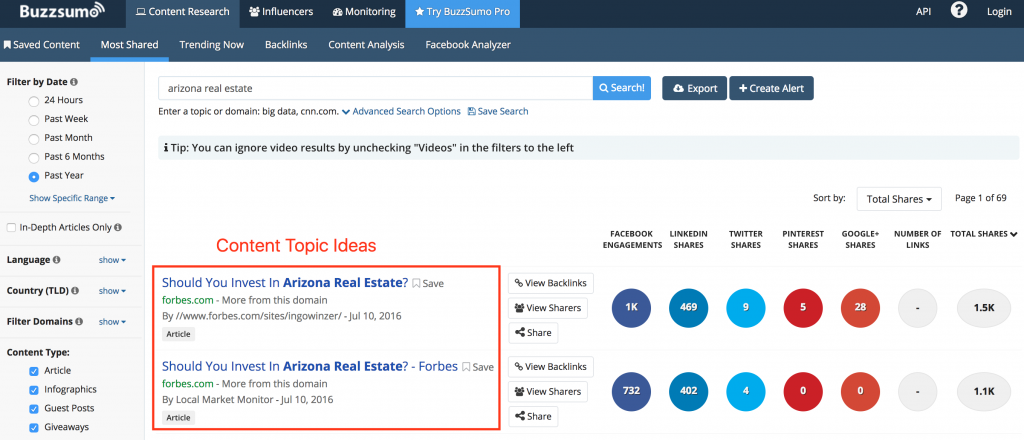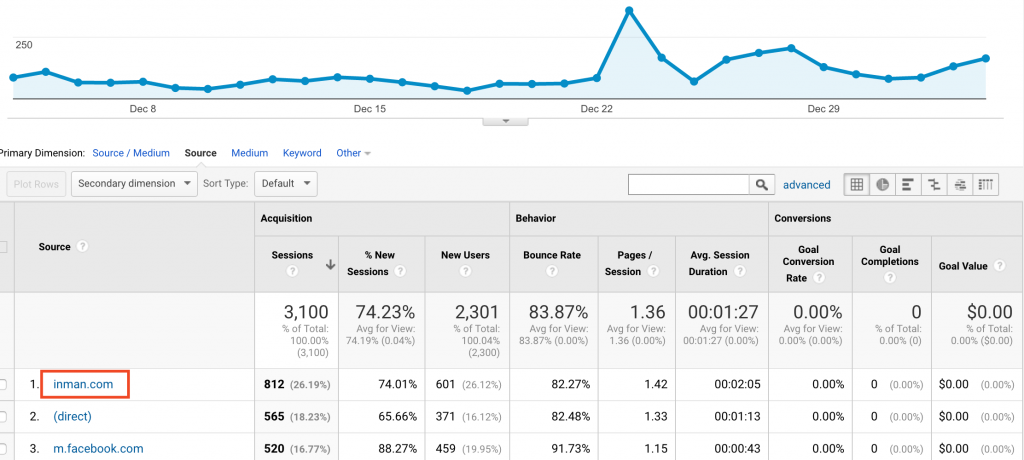As a 21-century real estate agent, content marketing is something you can no longer ignore if you are planning to be successful. We understand that you have to deal with nurturing existing prospects, prepare for listing presentations, and everything in between.
Why You Need a Comprehensive Real Estate Content Marketing Strategy
While the notion of “content marketing” (if not the actual term itself) was invented quite a long time ago, it’s still a relatively new concept in the Age of the Internet, including for some agents and brokers.
Having said that, a considerable portion of the roughly 2 million certified real estate professionals nationwide have at least started marketing their businesses online, especially with original, relevant, search-optimized content.
A number of these agents and brokers across the U.S. and Canada have crafted carefully constructed content strategies that help them routinely generate new leads, earn more referrals, nurture current prospects, and, ultimately, turn these individuals into new clients.
Professional marketers often agree with the fact that the leads generated from content marketing are higher in quality compared to paid advertising.
From regularly published blog posts that educate and inform about their audiences about buying and selling, to reports, guides, and infographics that highlight local housing data and market features, there are myriad types of effective content the modern-day REALTOR® (that’s you!) can produce often to broaden brand awareness and build their businesses.
So, the question remains: How do other agents and brokers around the country thrive with their content marketing … and what can you do to replicate (and even surpass) their online efforts? In short, by sharing your unique industry expertise through routinely published, easily digestible digital resources on your website — ones you can, in turn, leverage in your email marketing and on social media — you can continually and consistently grow your brand … all of which you can learn how to do below.
What a Modern Content Marketing Strategy Looks Like for Real Estate Pros

Ideation, creation, publication, and promotion: These are unquestionably the four main cornerstones of modern content marketing — and ones which all REALTORS® need to familiarize themselves with.
Sure, they all are undoubtedly tasks that require a substantial amount of time and energy. If you understand how you can build and gradually fine-tune your content-marketing-for-real-estate strategy, you’ll see the kinds of results that can enhance your online presence, bolster your branding, and — ultimately — transform your agency for the better.
For instance, many agents and brokers assume a couple of keyword-stuffed articles (more on that below) each month will be enough to boost their website traffic and lead generation. The truth, however, is you need quite a bit more regularly published site content than that each month to succeed with your content marketing.
- Site pages and posts that are posted to your site with a relatively high frequency (at least one per week is ideal)
- showcase your community, inform your core demographics on how to purchase and sell homes, and teach them about your business at large is how you “win” at content marketing.
Check out the example below.

Check out how this blog is sharing useful content targeting homeowners.
Before you craft a single piece of real estate website content for your agency and promote that collateral through each of your online primary marketing outlets, ask yourself the following questions:
- Do I know my primary audience and have enough info about them to create real estate buyer personas?
- Do I understand which types of content assets can help me generate and nurture leads online?
- Do I have the resources needed to start a content marketing strategy toay if I wanted to do so?
- Am I committed to not only start my content marketing plan but also willing and able to stick with it?
When the answer to all four of these questions is an unequivocal “yes,” you’re ready to get started — and the best place to do so is by learning the ins and outs of search engine optimization (SEO).
How You Can Get Started with Making the Most of SEO for Your Brand Website
Let’s address the sizable elephant in the (digital) room: Not many REALTORS truly know what SEO means.
Bonus: SEO Guide For Real Estate Agents
If you fall into this category, relax! Here are the absolute, bare-bones basics of SEO for real estate agents and how you should start your search optimization efforts:
•Once you discover who your niche audience is (e.g. high-end luxury home buyers, suburban single-family home sellers, retirees looking to downsize residences, etc.), determine the types of long-tail (meaning at least a few words) terms and phrases (primarily known as “keywords”) they enter in search engines like Google.
- Then, you enter those terms into a keyword research tool, like the Google AdWords Keyword Planner, to identify the popularity (how often their searched online) and competitiveness (how often other brands use those terms on their websites). There are zillions of other helpful keyword and content research tools that can help you find the best keywords for your site (BuzzSumo, ahrefs, and Moz’s Keyword Explorer come to mind) but try Google’s software first to nail down your core keyword list.
- After you find out which locally focused, long-tail keywords your buyer persona(s) search most often, you can begin planning which of those keywords to implement across pages of your site and what kinds of similar iterations of those terms to experiment with too. For example, if you work in Chicago and learn “Chicago two-bedroom homes for sale” is a common keyword your audience Googles monthly, try using similar keywords, like “Two-bedroom homes for sale in Chicago” and “Two-bedroom Chicago homes for sale,” on your site pages.

To create a winning real estate SEO strategy that garners your site more traffic — and adds more leads to your CRM — requires quite a bit more knowledge than this relatively elementary breakdown. However, this is basically how the world of modern search operates and how you should approach building your site so its numerous informative pages get found atop the first few pages (hopefully the first page, in time) of Google (and, to a lesser extent, Bing and Yahoo).
What Types of Relevant, Search-Optimized Content to Create First and Foremost
With a solid grasp of SEO in hand, focus next on the real estate content types in which you can incorporate your top keywords. Your blog may seem like the obvious candidate to feature the premier terms and phrases searched online by local sellers and buyers interested in your market. The truth, though, is every page — yup, every single one — needs to have a dedicated group of keywords featured.
The best way to segment all of your keywords intended for use across your website is to bucket them by shared commonalities. Take this example of a potential seller resource page on your site. You obviously won’t want to include buyer-oriented keywords on this page, right? That means that’s one entire group of keywords you can exclude right off the bat.
Having said that, you don’t want to include just any seller-themed terminology on that particular page. Think of keywords like “[your market name] home seller’s guide” and “[your market name] seller resources” to start with, then find similar ones to research based on these main terms.
Another useful trick you can use to generate organic traffic in your area is to leverage list posts for top restaurants, top plumbers, top pizza shops etc. in your area.
Over time, you can use handy tools like Google Analytics — an absolute must-have platform for your real estate content marketing — to (you guessed it) analyze the performance of each page and its keywords in the weeks and months ahead and, in turn, determine their effectiveness.
Leveraging SEO on each page is the ultimate long-term marketing play for your business, but it’s important to note here that you should always write for your audience first — in other words, produce pertinent, local-market content that helps them in their quest to buy or sell a home — and then focus on adding your long-tail keywords throughout your site.
Doing the opposite is the online marketing equivalent of putting the horse before the cart, so be sure you know your buyer personas inside and out and how you can provide relevant info that can enlighten them before worrying about whether your pages have the right kinds and number of keywords.
How to Brainstorm and Plan Out Your Content Efforts for the Months Ahead
At this stage, you’re probably wondering, “What about the actual kinds of content I can create for my audience? And how do I organize my content ideation, creation, publication, and promotion?” We hear you … and we have a specific plan for you to put in place so you can begin your content marketing in earnest today.
Organization is one of the top traits any top-producing REALTOR has today. The best-of-the-best agents and brokers can easily prioritize which leads to nurture first and foremost, improve efficiency with their overall business management, and structure their content marketing plans — the latter of which starts and ends with an editorial calendar: the backbone of all professionals’ — real estate and otherwise — content marketing blueprints.
Pro Tip: A significant part of your content marketing strategy should include backlinking to your website from other sites. This means you need to reach out to other websites in your area or sites that write about communities. Ask them if you can write a guest post on their blog. Most webmasters will say yes because a guest post allows their website to have more content and you get a backlink pointing to your site for better SEO.
Check out how much traffic we generated when we shared an article on Inman.

3 Effective Tips For Planning Your Content
1) Develop tons of content marketing ideas for your brand: Whether it’s a high-level concept you have and want to work on further to make more specific or a fully fleshed-out collateral idea you want to schedule for your next content creation period, your editorial calendar should allow for a “brain dump,” so to speak, in which any and all potential content pieces you could create come to mind.
2) Schedule specific days to write and publish your content: Think of your calendar as organized chaos: You can schedule specific times and dates for which your content should be posted to your website, but those don’t have to be set in stone. You can be agile with your content marketing efforts and move things around on your calendar (or delete items altogether) as needed, but a tentative schedule can keep you focused and on track to ensure you don’t slip up with your content publication.
3) Plan out your content promotion for the months ahead: Email is your best friend. Well, it should be, at least, if it’s not already. The reason is simple: Email is arguably the most powerful promotion tool for your marketing strategy as a whole, not even just for your content. Once you know when a piece of content will be completed (written, edited, and search-optimized), you can then schedule it to be included in one or more email campaigns, like a weekly or bi-weekly newsletter email featuring your latest blog posts, new local listings, and general brand updates.
If there’s one piece of advice when it comes to building your real estate content calendar, it’s this: Consistency is key. When your content efforts are done well and you gradually build a (relatively) loyal following for your site (i.e. possible leads who enjoy reading your articles, viewing your area pages, and consuming other types of content), you need be consistent.
Pro Tip: If you post two articles one week, then nothing again for a month, your site visitors won’t know when to come back for “more.”
The best way to ensure they know about this consistent publishing of articles, new pages, and other collateral is through the aforementioned email promotion, but don’t forget about the power of social media for your marketing as well. It’s the same concept as getting going with your content marketing:
Simply build a presence to begin your social marketing efforts, then work on enhancing your presence on each channel — specifically, Facebook, Twitter, Instagram, LinkedIn, and Pinterest. Once you’re settled in with your social presence, you can share your content via targeted ads.
How You Will Succeed with Your Real Estate Content Marketing Plan
For real estate agents, marketing a business through detailed, pertinent, SEO-friendly content is just one lever in the overall marketing machine. Paid advertising, public relations, and even offline promotion (mailers, billboards, etc.) all have a place in modern real estate pros’ marketing schemes.
Given the many benefits an organized, consistent content strategy offers agents and brokers — cost-efficient lead generation and nurturing, gradual search ranking improvements, easy brand awareness building (the list goes on) — it’s vital to get going with your content efforts today.
The essential traits you’ll need to thrive in the long run with your content marketing plan are undoubtedly patience and sticktoitiveness.
Few, if any, full-time REALTORS® working today can say they earned dozens of high-quality leads within the first week, or even month, of publishing content to their sites.
With a clear, long-term vision for your content marketing, you will most certainly see the fruits of your labor — and be able to grow your business substantially.






